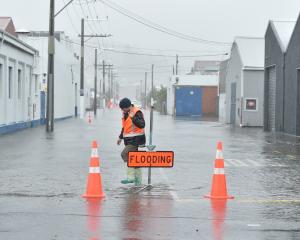
Less melodious than the Cat Stevens song about schoolyards and laughter, bells and buzzers will next week signal a switch from six weeks or more of summer holiday freedom to a world of rules and routines.
Yet school discipline is both fixed and highly flexible, according to an assortment of Dunedin personalities involved in an education system in which expectations of teaching staff have evolved. Like all those socks, shorts, kilts and ties, adjustment is required.
Their range of behavioural tools may not extend to seclusion rooms — which were banned by the Ministry of Education late last year following a range of high-profile cases — but drastically punitive measures are out of favour anyway.
The landscape of school discipline has altered dramatically in recent years. So much so, one secondary school principal has labelled the changes as "seismic".

"What was once seen just as a process of dealing with naughty kids, who would have been sent out and disciplined, is approached in a totally different light.
"A lot of effort has been put into teachers’ professional development, covering all manner of relationship management. It’s also about understanding the myriad contexts in which young people operate in a hyperconnected world. These include cultural, social, economic, health and environmental factors."
Mr O’Brien is referring to the notion of "pastoral care". Encompassing behaviour management, discipline and general wellbeing, it is at the forefront of an overall approach aimed at fostering a positive learning culture.
"Without that — as well as understood boundaries — learning becomes difficult and, in extreme cases, impossible for students, some of whom can become fully disengaged or marginalised from formal schooling and learning."
Mr O’Brien is not suggesting all is perfect. A Ministry of Education report late last year said physical assaults, sexual misconduct, weapons, arson and drugs were among the issues faced by Otago schools in 2015.

"The way in which schools carry out such processes varies," Mr O’Brien says.
"Education legislation allows some freedom of policy making through school boards ... , although all are legally bound to act fairly. However, there is sometimes a gap between what some in the community expect around punitive measures for behaviour and what is done, or seen to have been done.
Several years ago, in response to a report school behaviour had declined, conservative Christian lobby group Family First claimed the withdrawal of corporal punishment had led to an increase in school violence.
"Discipline and responsibility are being replaced by the politically correct nonsense of children’s rights. Student behaviour will continue to deteriorate for as long as we tell them that their rights are more important than their responsibilities . . . and that there will be no consequences of any significance or effectiveness for what they do," declared a statement from Family First.

"In the 21st century, our default position should be a focus on the child and doing all we can to restore relationships and keep the young person engaged and connected."
Here’s a question that’s unlikely to appear in any exam papers: what’s the fastest way to get from the subject of school discipline to the topic of, well, not thinking straight?
The answer: have a chat with Averil Pierce.
Having founded Dunedin-based primary and intermediate school mobile counselling service ChatBus in 2006, she has seen demand for a sympathetic pair of ears grow. ChatBus now has three small buses, each of which is driven by a counsellor to schools in Dunedin and Mosgiel, and there are plans for a fourth.
From within a bus interior bedecked with soft toys, books and pictures, Mrs Pierce has been privy to the gamut of behavioural issues exhibited by school pupils. She has talked to children who have been violent, sexually inappropriate, disrespectful, disruptive and withdrawn. Her conclusion: when children behave badly, it’s often a survival response. She knows this because she has listened to — and acted on — tales of sexual and/or physical abuse, neglect, anxiety and relationship breakdowns. The list goes on.
"When a child is in a traumatic situation, their brain function is like a seesaw," Mrs Pierce says.
"They go into survival mode and that can compromise the function of the frontal cortex. That means they cannot focus and learn in a classroom. They are just surviving, getting through the day."
As well as psychological problems, there are many other factors that can contribute to perceived behavioural issues. These range from language and auditory-processing delays, to autism and Asperger’s, to ADHD, to traumatic brain injuries and fatigue. And if a child is cognitively impaired, for whatever reason, they will probably lack insight into their behaviour, Mrs Pierce says. Therefore the consequences of their actions — i.e. disciplinary measures — could be regarded as meaningless, ineffectual.
Late last year, Heidi Hayward, principal of Dunedin North Intermediate, penned an open letter to government ministers Anne Tolley, Paula Bennett, Nikki Kaye and Hekia Parata to express her concern over a lack of resources to help a number of "at-risk" children at her school.
"There was a time when I took solace in the belief that while I could not educate some of the at-risk children, I could at least provide comfort, safety and security for them five days a week," she wrote.
"More and more, I feel that this is no longer possible and it is truly heartbreaking to be able to offer so little support, let alone an education, to these children."
Contacted this week in regards to how DNI deals with behavioural issues, Ms Hayward raised a point more typically debated by psychologists. Known as the "hierarchy of needs", the theory broadly postulates a pyramid, the base of which comprises physiological requirements (e.g. food, water, sleep). Only after fulfilling these fundamental needs can people then look to satisfy higher levels, such as a need for safety and security, then belonging and love, then self-esteem.
Although Abraham Maslow’s 1943 theory has been revised, its limited methodology and assertions questioned, Ms Hayward’s point stands: "If some basic human needs are not being met for some children — and that’s beyond the control of the school system — nothing else is going to happen. For kids in that situation, education is so low on their priorities.
"There is also the issue of children who may not be seen as having what might be termed special needs, but perhaps should be viewed in the same way, in that their existences have been altered by a range of factors. Yet they look OK and can speak OK ... it’s a huge gamut. So there has to be flexibility in how we deal with children."
Richard Hall, Otago Boys’ High School rector, says one of the best ways to instill and maintain good behaviour is to "sweat the small stuff".
The theory is that if you deal with all the small things — and, yes, this includes having socks up and shirts tucked in — it helps with behaviour in general.
"I think if you get the school culture and values right, then everything else flows from that," Mr Hall says.
"And discipline is part of that culture. One of our core values is respect. Nothing happens without it.
"Teachers need to be able to form strong and positive relationships with students," Mr Hall says, adding that doesn’t necessarily mean pupils like the teacher.
Debbie Smith, principal of Musselburgh School and chairwoman of the Otago Primary Principals’ Association, notes about 5% of children have behavioural issues that make it hard for them to fit into the school system.
"These are kids who live in very challenging environments involving mental health, drug and alcohol abuse, sexual abuse, parents dying, parents separating . . . And that’s where we need to look at interventions beyond mainstream strategies. These children need background services such as special education, psychologists and other agencies.
"Then there is another cohort of around 15% whose behaviour spikes or fluctuates depending on what’s happening at home or elsewhere.
"We also have children who are part of ORS, but a lot of them aren’t among that 5%," she says, referring to the Ministry of Education’s Ongoing Resourcing Scheme, which provides support for students with the highest level of need for special education services.
Mrs Smith believes good behaviour has much to do with routines and consistency, a clear outlining of expectations.
"Children need a clear indication of what the boundaries are, and what will happen if they overstep those boundaries. Children do have to respect their teacher.
"There is definitely an element of the public that believes in tougher discipline and I often have discussions with parents around this subject. Some parents struggle with our values, one of which is to be kind.
"But I ask, how would you like your child to be treated at our school?"
The key to dealing with behavioural issues is knowing the child, Mrs Smith says.
"I can think of one boy who had a very challenging year. I won’t go into the ins and outs of it because that might identify him, but what he went through was horrendous. We saw these spikes in his behaviour; he would throw things around the room, be completely non-compliant. Any change would throw him."
Mrs Smith and her colleagues implemented a range of approaches to "de-escalate" the child’s behaviour: on arriving at school, he did some work with a teacher aide. This calmed him down and meant he could go into the classroom and work.
"We worked closely with Chatbus and other counselling services. We finally got to the bottom of the reasons for his behaviour. He’d lost trust and faith and respect for all sorts of people. The only stable thing in his life was school.
"We knew what this boy’s triggers would be so we acted. He might have been sent to the library for some time out, but not in the sense of any seclusion room-type approach. He would spend time reading books, playing games or drawing, or doing things with the caretaker.
"We no longer have detentions. Six years ago, that boy might have been punished in such a way, but no longer. You have to look deeper.
"There is always a reason why a child behaves in a certain way. Kids aren’t born naughty."












